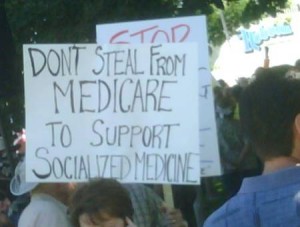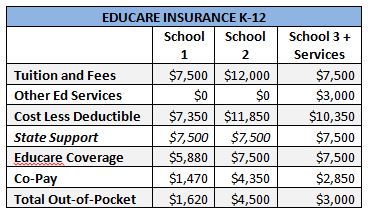School choice supporters have long pointed to government programs that assist people in buying goods or services to draw parallels to vouchers, tax-credit scholarships and (more recently) education savings accounts. Pell Grants, the GI Bill, food stamps and housing assistance programs all essentially function in the same way as education vouchers (some literally are vouchers).
Spurred by a recent newspaper column that was critical of school choice, I’d like to recast another government program as a model for education and choice: Medicare. (The author of the op-ed said she wouldn’t want her Medicare replaced with a voucher).
 Medicare, of course, is the government health insurance program that helps cover medical expenses (hospital visits, outpatient care, pharmaceuticals) accrued by Americans aged 65 or older. Indeed, a lot of Americans don’t want to alter Medicare. Even Tea Party Americans famously wanted to keep government out of their Medicare.
Medicare, of course, is the government health insurance program that helps cover medical expenses (hospital visits, outpatient care, pharmaceuticals) accrued by Americans aged 65 or older. Indeed, a lot of Americans don’t want to alter Medicare. Even Tea Party Americans famously wanted to keep government out of their Medicare.
We could “Medicarize” education by offering education insurance for every K-12 child. Let’s just call the program “Educare” and imagine it was passed under the Educational Premium Insurance for the Children Act, otherwise known as EPIC (because politicians love acronyms).
Educare would provide coverage for 13 years of education. After the $150 deductible, the insurance would cover 80 percent of tuition and fees – or up to the full public state support, whichever is smaller. The remainder would be the student’s co-pay.
For those interested in income equality and “fairness,” we could limit the maximum co-pay based on household income so lower-income families have a smaller out-of-pocket expense. Or perhaps the deductible would increase for higher household incomes.
Like Medicare, Educare would be good for both public and private institutions. We could even have an Educare Part D which covers education-related expenses such as tutors, textbooks, school supplies and electronic education materials.
School choice opponents would have a difficult time opposing the “Medicarization of education.” More importantly, they may come to realize how similar vouchers, tax-credit scholarships and education savings accounts are to other government programs that many of them love and support.




This turns into welfare for the well off and i really don’t think we should subsidize the millionaires who send their kids to exclusive prep schools.
Good point Chris. In that light, should we also keep the well off out of free public schools? At the very least should we make them pay a tuition to attend? While we are at it, maybe we should change up funding for higher education too. It really isn’t fair that wealthier kids receive the same public support to attend college as lower income kids… especially since so few lower-income kids actually end up going to college.
Are you advocating for the end of free, local public education (which is arguably a cornerstone of our American democracy)?
Hi Darcey,
I wouldn’t call public education the corner stone of American democracy considering the institution was ever evolving and didn’t exist in its current form for the first two centuries of our nation’s history. There wasn’t a compulsory state public education system in the U.S. until the mid 1800s. Before that public schools were literally locally controlled with parents and community members paying tuitions and hiring and firing the teachers. Public schools didn’t become nonsectarian until the mid to late 1800s and not even secular until the 1970s and 80s. And don’t forget there were no public high schools for African Americans until the mid to late 1800s and that schools were racially segregated until the 1950s and 60s.
History lesson aside, no I’m not advocating the end of free public education, merely changing how we define public education. Why does public education have to be a government controlled and operated institution where children are assigned by zip code? Why can’t the public simply provide the funds necessary for education and let the parent and child choose the option that works best?
[…] Apparently Step Up for Students Patrick Gibbons does: […]
[…] Apparently Step Up for Students Patrick Gibbons does: […]